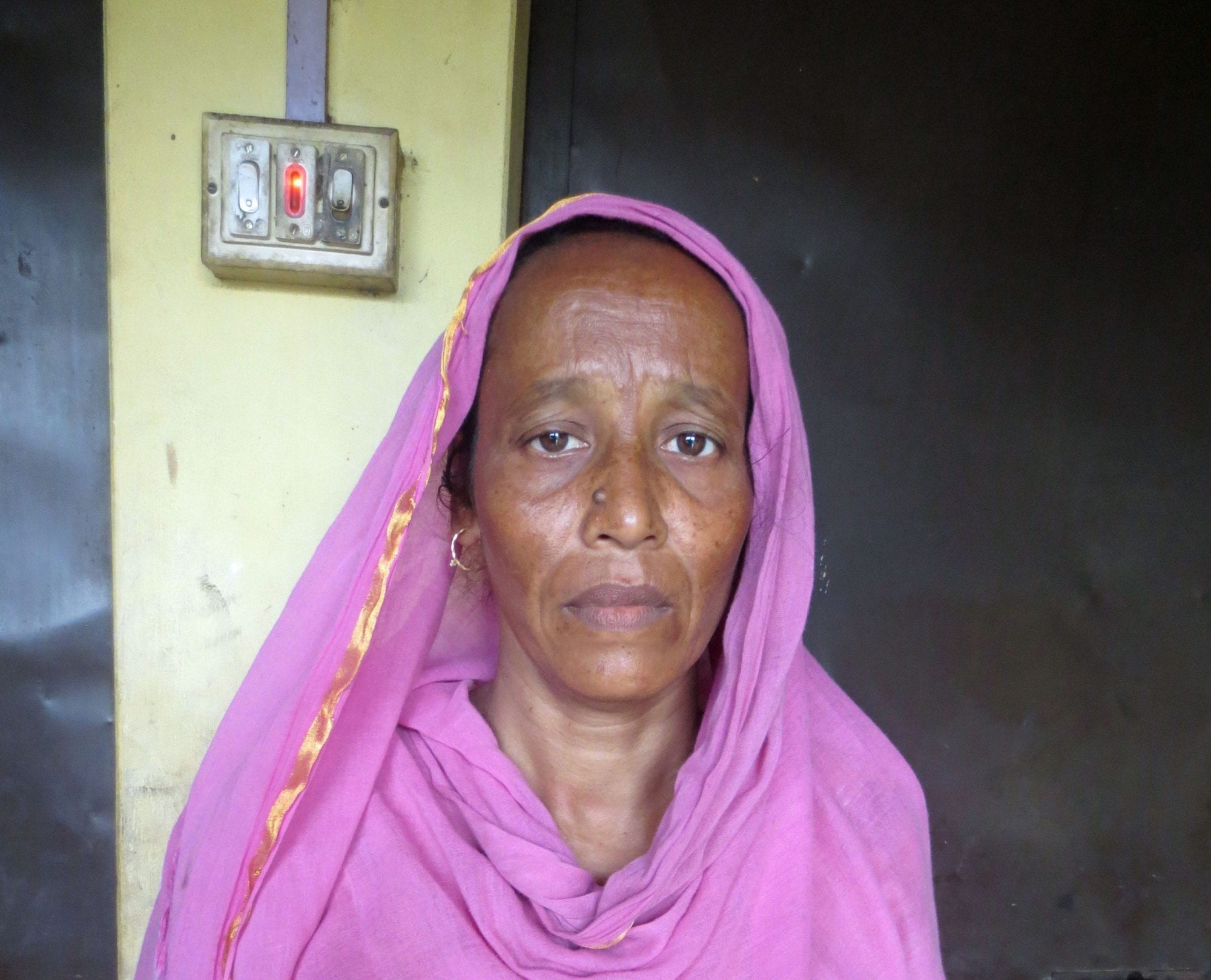
Nov 22, 2013
Raoshonara is destitute. “I have no other option but begging to survive,” she said, and burst into tears. The 35-year-old garment worker is unable to support herself or her family after suffering severe injuries escaping the factory fire that decimated Tazreen Fashions where she worked as a finishing operator. Raoshonara, like her co-workers at the multistory factory, was forced to jump out of a window because the building had no fire escapes. Some 112 workers died in the November 24, 2012, tragedy at Tazreen, located just outside Dhaka, the Bangladesh capital.
Unable to work because of disability and pain—“I cannot even sit for more than 30 minutes at a stretch,” she said—she sent her children back to her home village because she cannot support them. “I am not even able to buy food for them,” she said. Raoshonara is living with her sister, who buys her food and medicine. But that assistance will soon end. Raoshonara says her sister “won’t be able to continue her support for very long because she has to maintain her family.”
Raoshonara paid her initial medical bills with the compensation she received from the Bangladesh Garments Manufacturing and Exporting Association (BGMEA) and the private, Jesuit-run organization, Caritas. But she needs far more medical care and neither the factory owner, nor the brands, nor the government is offering Tazreen victims any assistance.
Her backbone is damaged from falling three stories. She suffers severe pain from a leg fractured in the fall. Another leg was sliced by a machine in the melee before she jumped out the window, as panicked workers stumbled in the dark trying to escape. And like nearly all Tazreen survivors, she is psychologically traumatized. “I get frightened when I see any big building. Fear of death always keeps me frightful and makes me cry,” she said.
Raoshonara came to Dhaka in 2008 from a small village in the Jamalpur District, after she was abused by her husband who frequently demanded large amounts of money as dowry. To pay him, she sold the small property her father left her and her brothers in the village. Once in Dhaka, at Tazreen, she worked hard and planned to send her children through school. She was filled with hope for her new life.
Now, she says, she is begging just to survive.
Nov 22, 2013
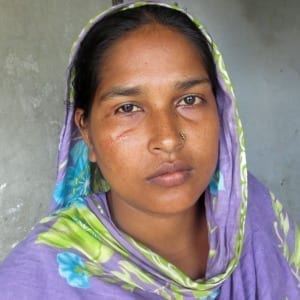
Morsheda is forced to send her son to live with relatives because she can no longer support him after being injured in the Tazreen Fashions factory fire. Credit: Solidarity Center
Morsheda could not travel to her home village in Bangladesh for the recent Eid holiday because she could not afford the trip. Her 9-year-old son, who lives in the village with his grandmother, told neighbors there that he does not have parents because if he did, they would be with him for the holiday
“You cannot imagine how very painful it is for parents to hear such words from their child,” she said.
Since sustaining severe injuries in the November 24, 2012, Tazreen Fashions garment factory fire, Morsheda, 25, has been too disabled to work. Without funds for her son’s education, she sent him to live with her relatives.
Morsheda has lost the use of her right hand, so badly damaged during her flight from the blaze that swept through the multistory factory that she can only prepare meals with the help of her sister. To get out of the factory, Morsheda, like nearly every Tazreen survivor, was forced to jump from a window to safety after she and co-workers found the stairwell exits locked. They escaped even though their manager had ordered them back to work when the fire alarm sounded. Her right eye was gashed as a result of her fall, and she still has difficulty seeing from it.
“My whole body is swollen when I wake up from sleep,” she said. “Every night I feel pain in my right leg and my waist.”
Her husband, also a garment factory worker, is not paid enough to buy the medicine she needs. “With his income, it is tough to buy medicine, to run a family, to pay for my son’s educational expenses, to pay back loans, etc.,” she said. The little money Morsheda received in compensation for her injuries was quickly spent on her medical care.
Morsheda believes that the factory owner, the brands and the government have forgotten her and the thousands of other Tazreen garment workers now too injured to support themselves and their families. Morsheda says she needs real assistance if she and her family are to survive.
Morsheda and her husband came to Dhaka, the Bangladesh capital, several years ago in search of jobs. With two incomes, the couple could pay for their son’s education. But now, out of school and missing an education, they fear their child will face a bleak future, one that likely will continue the cycle of poverty.
“Leading a better life is not only the hope of rich people but also the poor people like us,” Morsheda said, crying. “Garment owners have much money. They have the capability to run so many garment factories. They have nothing to lose. But we poor have lost everything.”
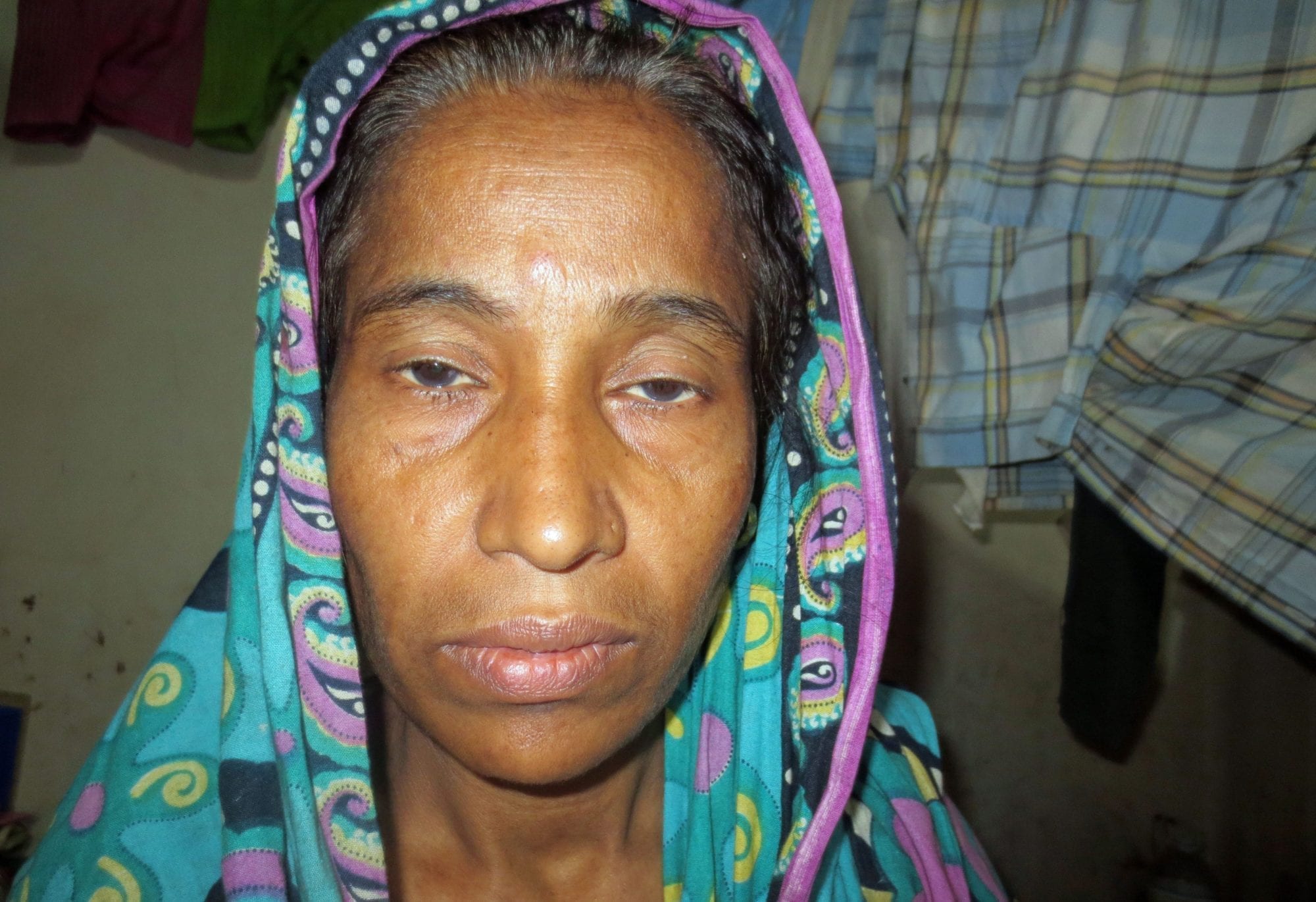
Nov 22, 2013
When someone knocks on her door, Anjuma knows a debt collector is likely on the other side. But ever since she escaped with severe injuries from the disastrous fire at the Tazreen Fashions factory where she worked as a cleaner, she has had no money to pay her bills.
“People become the prisoners of jail, but I became a prisoner of the world,” Anjuma, 45, said with a blank look. When the fire broke out, killing 112 workers at Tazreen, on the outskirts of Dhaka, Bangladesh, Anjuma jumped out a fourth-floor window onto a nearby roof. But her leg was sliced by a metal rod, and the debilitating injuries she sustained have made it impossible for her to work again. Faruk, a fellow worker who helped her escape, died in the consuming blaze. Anjuma also lost three cousins at Tazreen, one of whom was never found.
“My husband is a rickshaw puller but he is very old and not able to work more,” Anjuma said. She has three sons and a daughter. Among them, only one takes care of her. But he earns little, and has gone into debt as well, trying to help her. She has so many medical expenses, she cannot afford rent or food, and her landlord twice locked her out of the house for not paying rent. She’s now seven months behind in payments to her landlord.
Anjuma received no compensation for her injuries. Not from her factory employer. Not from the Western brands whose clothes were made at Tazreen. And not from the government. Each week, she travels to a hospital for treatment and finds it difficult even to pay for the transportation.
Since the Tazreen disaster, Anjuma often feels dizzy. She has difficulty walking and is weak because “days pass by without food.” She recently passed out from blood clots in her nose and chest. Once, Anjuma stitched beautiful kantha (handcrafted material). Now, she can no longer do fine needlework because she cannot see well.
As a survivor of the Tazreen fire, Anjuma wants the government to help her with medical expenses so she can again earn a wage and pay her bills. Anjuma does not know how she will manage her medical treatment expenses, pay her debt or support her household. But she does know this: She will never again utter the words, “garment factory.”
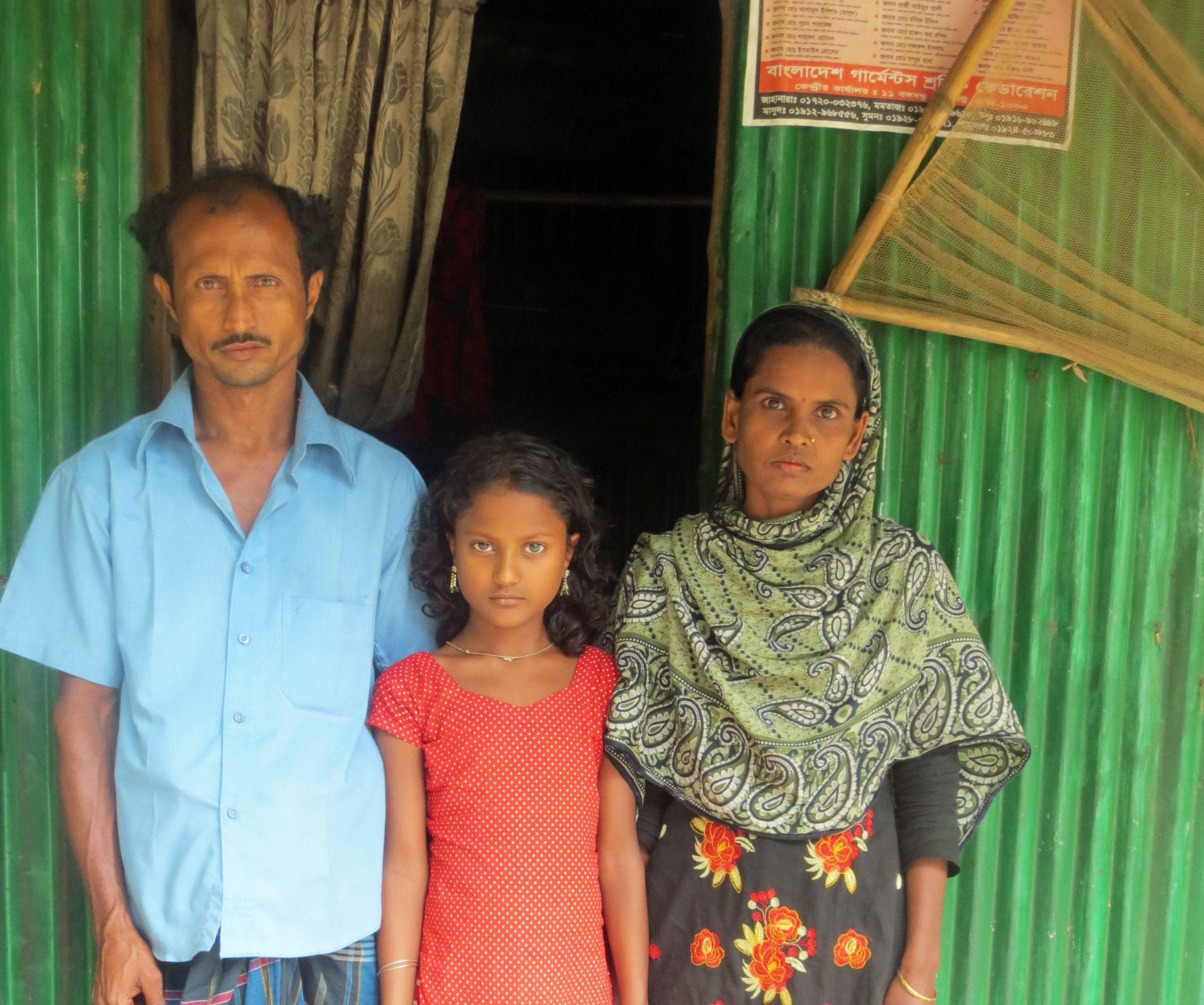
Nov 22, 2013
Anjuara suffers from constant pain. She is too injured to work and unable to pay the rent. Yet this is not the worst of her suffering following the November 24, 2012, Tazreen Fashions garment factory fire in Bangladesh.
“The most painful thing is that I haven’t been able to lift up my 3-year-old baby girl in my lap for the past year because of the severe pain in my hand and back,” Anjuara said, tears in her eyes.
Over the past year, Anjuara’s medical bills have added up to nearly $3,900—a fortune in a country where the average yearly income is $770, according to the United Nations. The compensation she received in the wake of the tragedy, $1,282.05 from the Bangladesh Garment Manufacturing and Exporting Association (BGMEA), did not come close to covering these costs. So she sold her few valuable possessions, such as her television and the small plot of land she owned in her village. She also went through her savings.
Yet she is far from well and may never be able to work. She is regularly in pain and cannot sit for long periods. Anjuara sustained two broken vertebrae and a broken shoulder when she made her escape from the blaze that killed 112 of her fellow garment workers and injured thousands more. Today, she is unable to lift heavy items.
“I haven’t been able to pay rent for five months,” Anjuara, 30, said. She lives with her husband and two daughters in Savar, just outside the Bangladesh capital, Dhaka. “I could not buy new dresses for my children last Eid and could not cook any food for them.” She owes more than $750 in loans and has no idea how she will pay them back.
“Sometimes I feel it would be better if I would have died in that fire,” Anjuara said, crying.
Her husband, Azahar, is a van driver. Anjuara said, “before this accident, we could save money for our children’s future. But now, because I can’t do any work, it is tough to maintain a family on only my husband’s income. Most of the time, my husband has to do the household work as I can not do heavy work at a stretch.”
Anjuara is stunned and saddened by the silence from the factory owner, international buyers and the government, none of whom have stepped up to assist Tazreen victims and their families. The Tazreen fire broke out on the first floor, where material was stored in the open, rather than in a fireproof room. The stairwells were locked, preventing workers from escaping the blaze, and managers uniformly tried to prevent workers from leaving when the fire alarm sounded.
“The Bangladesh government does not want us to remain alive. If the government wanted us alive, then we would get some financial support,’ Anjuara said. “We at least got condolences from the government. Our factory owner did not even express condolences to us.”
Anjuara, who came to Dhaka 12 years ago in search of a job with plans for a better life, has this hope.
“My wish is that no garment worker has to face any accident like the Tazreen fire.”
Nov 21, 2013
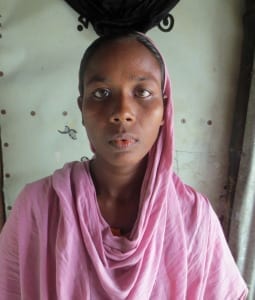
Aferza, 25, received no compensation after being seriously injured in the Tazreen Fashions factory fire and suffers from constant pain. Credit: Solidarity Center
To mark the one-year anniversary of the deadly Tazreen Fashions factory fire in Bangladesh, the Solidarity Center is highlighting stories of survivors and their families.
Aferza, 25, left her village in 2010 for Dhaka, the Bangladesh capital, to escape poverty. She planned to help support her family and educate her children with the money she earned.
On November 24, 2012, she was working as a sewing operator on the fourth floor of the Tazreen Fashions Ltd., garment factory when a fire swept through the building. Like nearly all workers who escaped the blaze, she was forced to jump from a window because the building had no fire escapes. Her husband found her lying unconscious among dead bodies near the burning building.
Her skull was fractured and a broken chest bone punctured her lung. Now, she says, “I am unable to take a glass of water on my own. I cannot sit or lie down for very long. I feel intolerable pain in my whole body and cry constantly.”
Unable to work, she sold the small plot of land she owned in her home village to help pay for medical expenses and food for her family. She spent the compensation she received from the Bangladesh Garments Manufacturing and Exporting Association (BGMEA) and Caritas, a private, Jesuit-run organization, for her medical treatment. “Living here with my husband and children, I cannot contribute to the maintenance of my family,” she says. “My husband is a rickshaw puller whose poor income cannot cover all these costs. Almost all of his earnings are spent on the cost of my medicine.”
As a result, she said, “I starve with my kids and cannot buy medicine for me.”
Some 112 workers died in the Tazreen blaze, which began in a first-floor warehouse of the multistory building. Like other Tazreen garment workers who recounted their experiences to Solidarity Center staff, Aferza says the production manager told them to remain at their work stations, despite the ringing fire alarm. She remembers the lights going out after the fire alarm and falling on the floor as panicked workers ran toward the windows. A co-worker helped her up to a window, where she jumped to the ground.
Even as she suffers from relentless physical pain, Aferza has also been psychologically wounded, fearful of tall buildings and crowds.
With no compensation from the government, the international buyers or the factory owner—and no way to go to work again—Aferza is depending upon loans for her medical treatment. “I have nothing,” she says. “I don’t know how I will survive in the coming days.
“My only dream is now to have food three times in a day, get better treatment and educate my children.”





